新概念英语第二册第45课.Lesson-45--A-clear-conscience教学内容
- 格式:ppt
- 大小:478.00 KB
- 文档页数:18
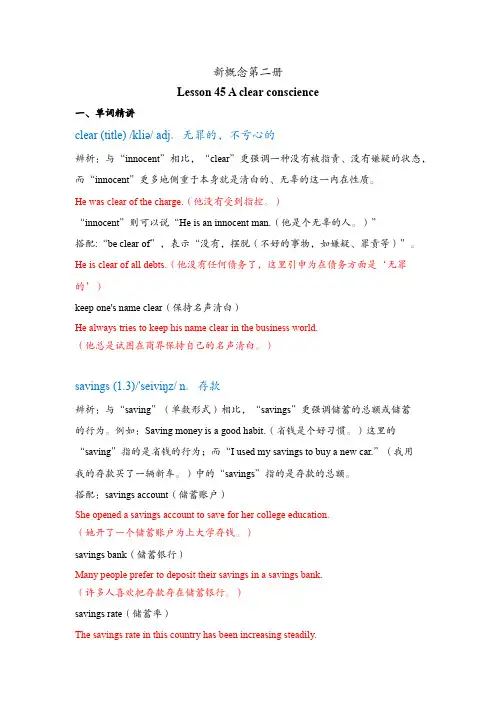
新概念第二册Lesson 45 A clear conscience一、单词精讲clear (title) /kliə/ adj.无罪的,不亏心的辨析:与“innocent”相比,“clear”更强调一种没有被指责、没有嫌疑的状态,而“innocent”更多地侧重于本身就是清白的、无辜的这一内在性质。
He was clear of the charge.(他没有受到指控。
)“innocent”则可以说“He is an innocent man.(他是个无辜的人。
)”搭配:“be clear of”,表示“没有,摆脱(不好的事物,如嫌疑、罪责等)”。
He is clear of all debts.(他没有任何债务了,这里引申为在债务方面是‘无罪的’)keep one's name clear(保持名声清白)He always tries to keep his name clear in the business world.(他总是试图在商界保持自己的名声清白。
)savings (1.3)/'seiviŋz/ n.存款辨析:与“saving”(单数形式)相比,“savings”更强调储蓄的总额或储蓄的行为。
例如:Saving money is a good habit.(省钱是个好习惯。
)这里的“saving”指的是省钱的行为;而“I used my savings to buy a new car.”(我用我的存款买了一辆新车。
)中的“savings”指的是存款的总额。
搭配:savings account(储蓄账户)She opened a savings account to save for her college education.(她开了一个储蓄账户为上大学存钱。
)savings bank(储蓄银行)Many people prefer to deposit their savings in a savings bank.(许多人喜欢把存款存在储蓄银行。


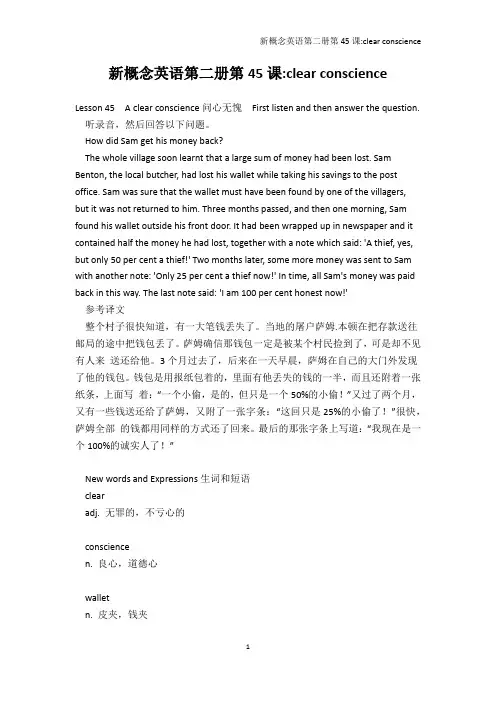
新概念英语第二册第45课:clear conscienceLesson 45 A clear conscience问心无愧First listen and then answer the question.听录音,然后回答以下问题。
How did Sam get his money back?The whole village soon learnt that a large sum of money had been lost. Sam Benton, the local butcher, had lost his wallet while taking his savings to the post office. Sam was sure that the wallet must have been found by one of the villagers, but it was not returned to him. Three months passed, and then one morning, Sam found his wallet outside his front door. It had been wrapped up in newspaper and it contained half the money he had lost, together with a note which said: 'A thief, yes, but only 50 per cent a thief!' Two months later, some more money was sent to Sam with another note: 'Only 25 per cent a thief now!' In time, all Sam's money was paid back in this way. The last note said: 'I am 100 per cent honest now!'参考译文整个村子很快知道,有一大笔钱丢失了。
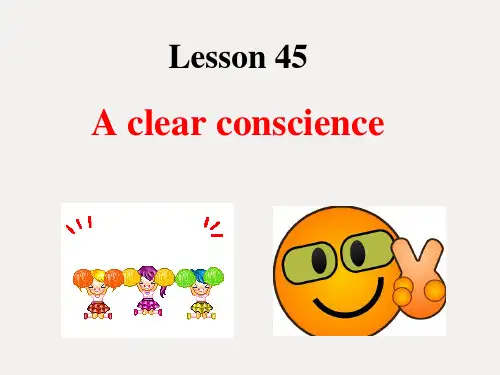
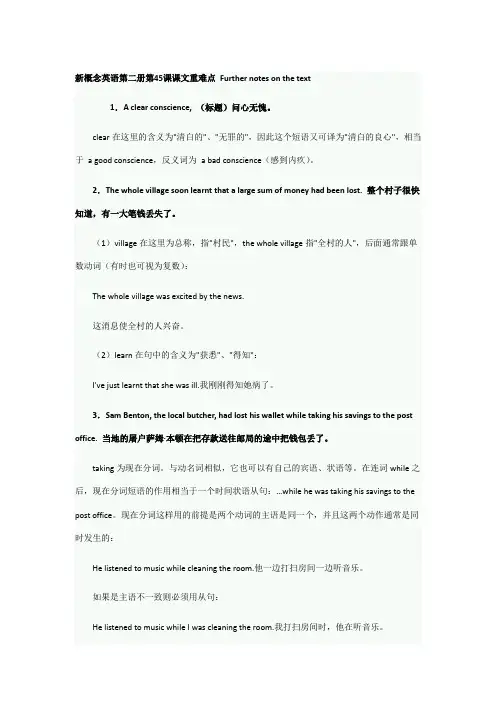
新概念英语第二册第45课课文重难点Further notes on the text1.A clear conscience, (标题)问心无愧。
clear在这里的含义为"清白的"、"无罪的",因此这个短语又可译为"清白的良心",相当于a good conscience,反义词为a bad conscience(感到内疚)。
2.The whole village soon learnt that a large sum of money had been lost. 整个村子很快知道,有一大笔钱丢失了。
(1)village在这里为总称,指"村民",the whole village指"全村的人",后面通常跟单数动词(有时也可视为复数):The whole village was excited by the news.这消息使全村的人兴奋。
(2)learn在句中的含义为"获悉"、"得知":I've just learnt that she was ill.我刚刚得知她病了。
3.Sam Benton, the local butcher, had lost his wallet while taking his savings to the post office. 当地的屠户萨姆·本顿在把存款送往邮局的途中把钱包丢了。
taking为现在分词。
与动名词相似,它也可以有自己的宾语、状语等。
在连词while之后,现在分词短语的作用相当于一个时间状语从句:…while he was taking his savings to the post office。
现在分词这样用的前提是两个动词的主语是同一个,并且这两个动作通常是同时发生的:He listened to music while cleaning the room.他一边打扫房间一边听音乐。
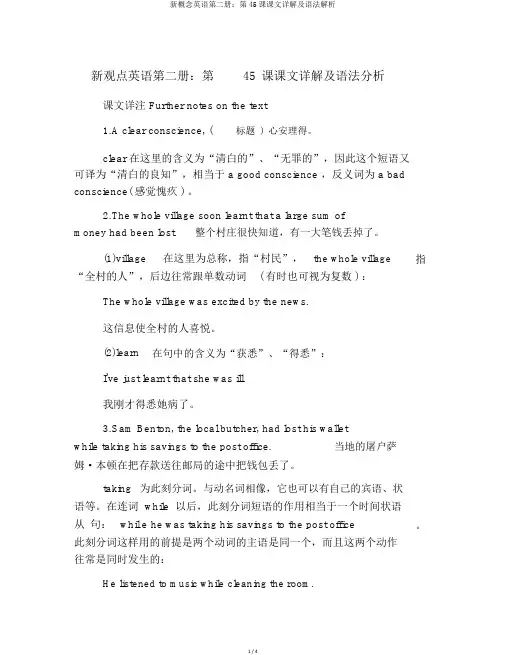
新观点英语第二册:第45 课课文详解及语法分析课文详注 Further notes on the text1.A clear conscience, (标题)心安理得。
clear 在这里的含义为“清白的”、“无罪的”,因此这个短语又可译为“清白的良知”,相当于 a good conscience ,反义词为 a bad conscience( 感觉愧疚 ) 。
2.The whole village soon learnt that a large sum ofmoney had been lost.整个村庄很快知道,有一大笔钱丢掉了。
(1)village在这里为总称,指“村民”,the whole village指“全村的人”,后边往常跟单数动词( 有时也可视为复数 ) :The whole village was excited by the news.这信息使全村的人喜悦。
(2)learn 在句中的含义为“获悉”、“得悉”:I've just learnt that she was ill.我刚才得悉她病了。
3.Sam Benton, the local butcher, had lost his walletwhile taking his savings to the post office.当地的屠户萨姆·本顿在把存款送往邮局的途中把钱包丢了。
taking为此刻分词。
与动名词相像,它也可以有自己的宾语、状语等。
在连词 while 以后,此刻分词短语的作用相当于一个时间状语从句: whil e he was taking his savings to the post office。
此刻分词这样用的前提是两个动词的主语是同一个,而且这两个动作往常是同时发生的:He listened to music while cleaning the room.他一边打扫房间一边听音乐。
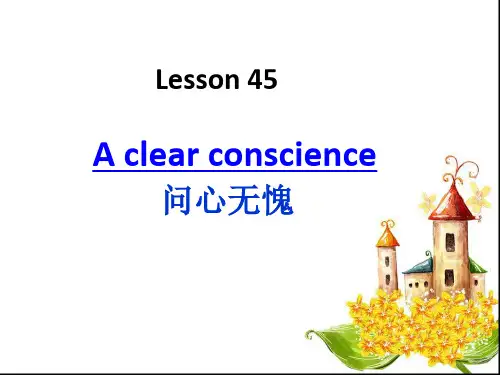

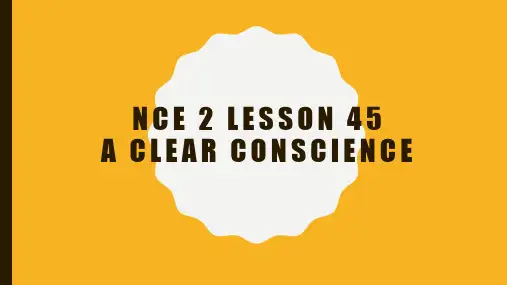

Lesson 45 A clear conscience 问心无愧clear在这里的含义为“清白的”、“无罪的”,因此这个短语又可译为“清白的良心”,相当于a good conscience,反义词为 a bad conscience(感到内疚)。
1.The whole village soon learnt that a large sum of money had been lost. Learn这里不是“学习”的意思,而是“知道、获知”的含义。
I've just learnt that she was ill. 我刚刚得知她病了。
a large sum of money had been lost这里是过去完成的被动。
主动语态应该是:The whole village soon learnt that Sam Benton had lost a large sum of money.2. Sam Benton, the local butcher, had lost his wallet while taking his savings to the post office.这里的“taking his savings to the post office. ”是个现在分词结构。
我们以前和大家讲过当两个动作是一个主语时,其中一个可以用现在分词或是过去分词来代替,从而省略一个主语,使得句子更加精练。
比如课文的这句话原来应该是:Sam Benton, the local butcher, had lost his wallet while he was taking his savings to the post office.When she heard the news, she got a shock当她听到这个消息时,大吃了一惊。
我们可以用现在分词改为:When hearing the news, she got a shock.3. Sam was sure that the wallet must have been found by one of the villagers, but it was not returned to him.“must have been found”这个结构我们要提醒大家两点:(1)must在这里表示推测,由于是对过去的推测,因此must之后的动词要用完成形式:When I arrived, he wasn't here. He must have left early.我到这儿的时候他已不在了。